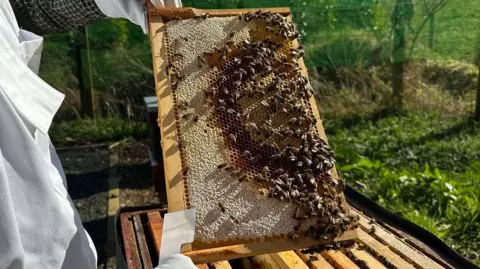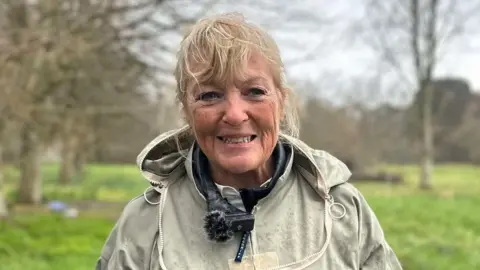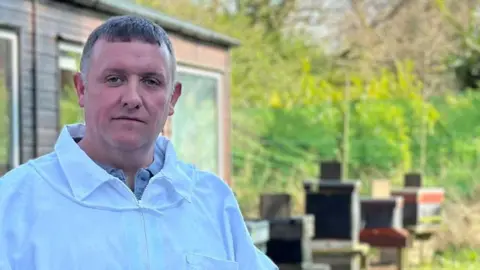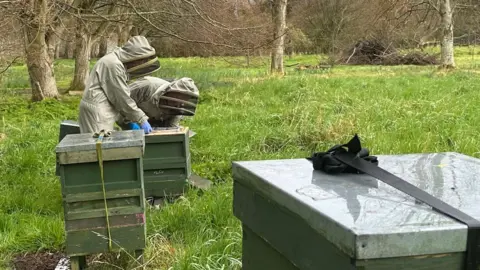Inspector absence puts bee population 'under threat'
 BBC
BBCNorthern Ireland's honey bees are "under threat" due to the absence of a bee inspectorate since last year, according to the chair of Ulster Beekeepers Association (UBKA).
The bee inspector is responsible for supporting bee health and addresses diseases such as American foulbrood (AFB) and European foulbrood (EFB) which affect honey bees.
Valentine Hodges described the situation as "critical", adding that she is angry and disappointed that the post is vacant.
The Department for Agriculture, Environment and Rural Affairs (Daera) said it "is responding to recent reductions in inspectorate staff available for bee inspections and recruitment competitions are under way".
The last full-time bee inspector retired at the end of October 2024 and the part-time inspector role has been vacant since December 2024.
Where AFB and EFB occur, the disease control of infected colonies is the responsibility of DAERA and its inspectors.
Although beekeepers must report diseases within their own colonies, bee inspectors confirm such notifiable diseases, contain outbreaks, inspect neighbouring hives, and advise on destroying affected colonies.
Why are bees under threat?

Habitat loss, climate change, including the effects of extreme weather, and parasites and diseases are all factors that affect honey bees.
American foulbrood, a bacteria that infects young bee larvae, is less common than European foulbrood but is considered especially deadly for a bee colony - it can spread through a hive leading to the entire colony's death.
Its spores can also live for decades making monitoring and managing bee colonies critical.
Mrs Hodges, a beekeeper in County Down who has about 80-100 hives, said bee inspectors "play a very important part in our normal beekeeping".
"We now are at a critical stage where, through lack of recruitment and replacement, we have no bee inspectors," Mrs Hodges stated.
"The diseases themselves are not a threat to the public, they are a threat to our bees."
However, she said if diseases spread, it could have a knock-on effect for food supply and pollination services due to honey bees being a key pollinator.
AFB and EFB do not affect the quality of the honey that the bees produce.
Mrs Hodges said Daera's recruitment process is "not good enough".
"It is good for the future, but we have a crisis right now," she added.

Gareth Gillan, a beekeeper for more than 20 years and treasurer at Mid Antrim Beekeepers Association, said he is "really concerned".
"Whenever we do get inspectors back, is there going to be loads of cases of foulbrood?
"American foulbrood especially is spore forming, so those spores can live up to 50 years, 60 maybe, max, so that will be in the environment for that length of time," he said.
"It's not something that will go away after a couple of years, they will still be present in the environment for a long time to come."
Mr Gillan said that about 15 years ago one of his hives had a confirmed case of AFB and he had to destroy the rest of the colony.
"I was a bit remorseful because I had only started my beekeeping career and this had happened. But it was best practice".
For the next two years his hives were checked regularly by the bee inspector for further signs of disease.
'Accountability'
In a statement, the Democratic Unionist Party's (DUP) Agriculture, Environment and Rural Affairs spokesperson Carla Lockhart said: "The beekeeping community has been raising alarm bells for months, and I've personally challenged the minister on this issue several times."
"Beekeepers deserve better. Our farming sector deserves better. And our environment demands better," she said.
"I will continue pressing the minister until we see meaningful action, proper accountability, and a full restoration of inspection services."

In a statement, Daera said it recently met the UBKA, adding that it is "committed to ensuring that its statutory obligations are fulfilled, which in the case of bee health is primarily to respond to confirmed findings of a notifiable pest or disease in honeybees".
"In addition, the department provides funding to the Agri-Food and Biosciences Institute (AFBI) to provide research and free testing for bee disease, available to support all beekeepers to maintain bee health in Northern Ireland," Daera said.
